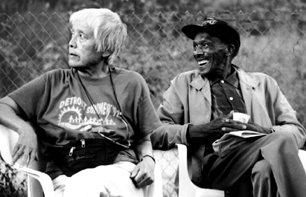Here's a link to an interview with an organizer with All Together, a Korean socialist organization, about the exciting summer of mass mobilization that just took place. It captures the movement dynamics that have taken place in SK, as well as the slowness of the left in responding to the spontaneous actions of the people. I think it's great how the organizer points out that this slowness arises largely from the elevated sense of self that the Left has, thinking that most everyday people are bought off by capitalism, until they get super shocked when things turn out in a way they dont expect, and can't respond to in time. The interview frames the election of the neo-liberal right-wing Lee Myung Bak, not so much as evidence of South Korean people shifting right as a whole, but more so as a punishment to the failure of the liberal imperialist parties of Kim Dae Jung and Roh Moo Hyun. There's a lot that can be learned from this piece.
The article also highlights the dynamic relationship that revolutionary organizations (like All Together), can have to the spontaneous movements of everyday people. It shows clearly that a movement is sparked off in large part because of a spontaneous action, yet an excessive focus on spontaneity as a movement continues, can be unsustainable. What sometimes arises is a lack of direction of the movement. All Together's participation and leadership in the movement did not destroy its spontaneity -- hundreds of thousands still came out to the rallies -- but it was able to try to push for a strong political focus, which tried to subvert the government's framing of the rally. The South Korean government kept trying to frame the rally as a "political" one, as opposed to the worker unions' "economic" agenda. The government's division of "economic" and "political" was a deliberate attempt to divide the ranks between workers and the rest of society. I see the South Korean government's attempt at framing this huge, massive, successful rally this way, as how official society tries to divide and conquer us amongst ourselves, even in our most successful times (infuriating!!). There is a need to contend for power and leadership in those situations, and All Together tried to do just that. Unfortunately, among other reasons, the trade union bureaucracy (KCTU) was too rooted in these similar "workerist" divisions and the movement wasnt able to cohere a strong sense of working class rebellion.
Anyway, once again, it means so much to me to see that folks in SK are moving!! So much for the model minority/Asian Tiger myth of docile and passive Asians! Check the interview out here.
Also, other articles by All Together, translated into English:
On the South Korean Left
Formation of North Korean capitalism
Was North Korean economy in crisis in the 1950s?
North Korea in the 1950s: Capital accumulation and power struggles
10/17/2008
Subscribe to:
Post Comments (Atom)





No comments:
Post a Comment